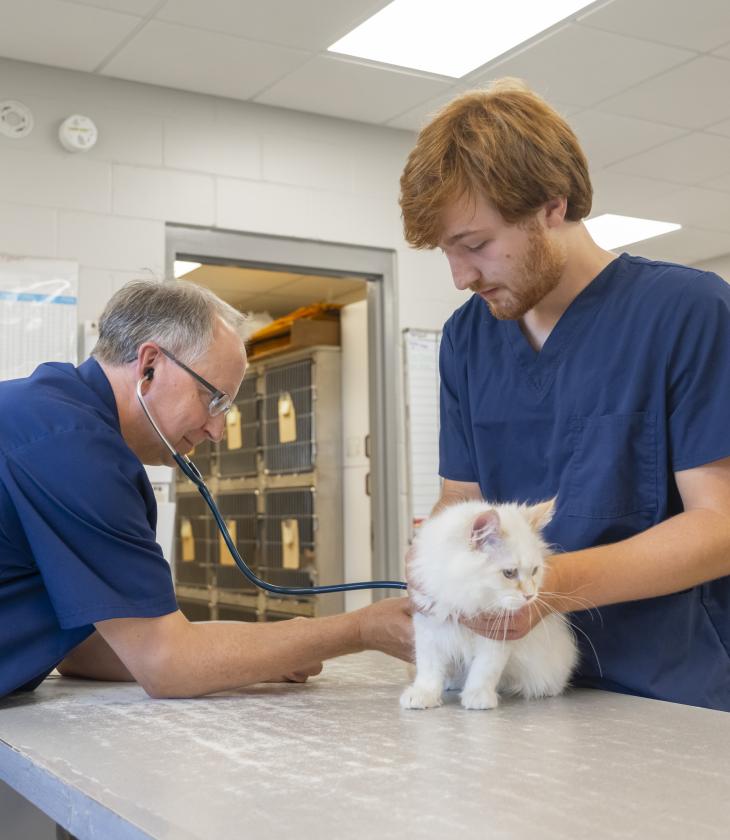Locating the right Veterinary Cancer Specialist for your animal companion
Wiki Article
Comprehensive Guide to the Providers Provided by a Vet Oncologist
Veterinary oncology includes a large array of solutions focused on diagnosing and treating cancer cells in animals. Board Certified Veterinary Oncologist. Oncologists employ innovative analysis techniques and provide various therapy options customized to each animal's demands. They additionally focus on supportive treatment and supply important resources for pet dog owners. Recognizing these solutions is necessary for making notified choices. What certain aspects of vet oncology can significantly impact a pet dog's treatment trip?Comprehending Vet Oncology
Vet oncology is a customized area focused on diagnosing and treating cancer cells in animals. This discipline incorporates a vast array of techniques, from clinical therapies such as chemotherapy and immunotherapy to medical treatments focused on getting rid of tumors. Vet oncologists are educated to recognize the one-of-a-kind manifestations of cancer in numerous species, enabling them to tailor treatment plans to individual people.Along with traditional treatments, veterinary oncology emphasizes encouraging treatment, which plays a necessary role in improving the lifestyle for damaged animals. This consists of discomfort management, nutritional support, and palliative care options. Cooperation with family pet proprietors is vital, as they are important to decision-making regarding their pets' therapy courses. As study developments, vet oncology remains to develop, using new hope and enhanced outcomes for animals diagnosed with cancer. In general, this field is essential for dealing with the intricacies of cancer in buddy pets.
Advanced Diagnostic Techniques
Advanced diagnostic methods play a vital role in vet oncology, supplying important insights into the presence and extent of cancer cells in pets. Imaging methods such as ultrasound, CT scans, and MRI are generally employed to imagine tumors and evaluate their features. In addition, biopsy treatments are crucial for getting cells examples, enabling for definitive diagnosis and customized treatment plans.Imaging Modalities Utilized
Imaging modalities play a necessary function in the diagnosis and administration of cancer in pets. Vet oncologists use different advanced imaging strategies to analyze lump size, transition, and presence. Radiography, or X-rays, provides an initial view of bone and upper body conditions, while ultrasound offers real-time imaging of soft cells, permitting in-depth evaluation of interior body organs. Computed tomography (CT) improves visualization of complicated physiological structures and enables 3D restorations, aiding in accurate growth localization. Magnetic vibration imaging (MRI) is important for soft tissue distinction, specifically in mind growths. In addition, nuclear medicine strategies such as positron emission tomography (FAMILY PET) aid identify metabolic task within lumps. Collectively, these modalities boost diagnostic accuracy, assisting effective therapy strategies for oncological clients.Biopsy Treatments Described
Complying with the initial assessment through imaging modalities, acquiring a clear-cut diagnosis usually needs tissue sampling via biopsy procedures. Vet oncologists utilize various biopsy strategies based on the lump's place and characteristics. Fine needle ambition (FNA) is a minimally intrusive method that extracts cells for cytological assessment, ideal for shallow masses. Core needle biopsies supply bigger cells examples and are useful for deeper tumors, enabling histopathological evaluation. Surgical biopsies entail excising a section or the whole lump, helping with detailed assessment. These procedures not only validate the visibility of cancer cells yet additionally aid determine its type and grade, guiding therapy choices. Each biopsy strategy is picked carefully to balance analysis precision with individual safety and security and comfort.Treatment Options for Cancer Cells in Pets
When a family pet is diagnosed with cancer cells, a selection of treatment alternatives appear to help take care of the disease and enhance lifestyle. Veterinary oncologists commonly recommend a multidisciplinary strategy tailored to the private pet dog's requirements, which may include surgery, radiation therapy, immunotherapy, or alternative treatments.Surgical procedure is commonly utilized to get rid of growths and damaged tissues, potentially leading to total remission sometimes. Radiation therapy intends to target and damage cancer cells, lowering tumor dimension and reducing symptoms - Veterinary Oncology Services. Immunotherapy uses the pet's body immune system to fight cancer better, while alternative treatments could consist of acupuncture or herbal supplements to sustain overall wellness
Each therapy alternative lugs its own benefits and dangers, and veterinary oncologists function closely with family pet owners to create a complete strategy that aligns with the animal's certain medical diagnosis and the proprietor's dreams. The ultimate objective is to improve the pet dog's convenience and lifestyle throughout their cancer journey.
Chemotherapy for Pets
Radiation treatment is an usual therapy option for pets detected with cancer and is commonly made use of combined with various other therapies outlined by veterinary oncologists. This therapy entails the management of particular drugs designed to target and destroy cancer cells, consequently minimizing growth dimension and protecting against the spread of the illness. Veterinary oncologists customize radiation treatment protocols based upon the type of cancer, the pet dog's general health, and the wanted therapy outcome.Adverse effects can happen, as these medicines may also influence healthy cells. Typical responses include nausea or vomiting, throwing up, and temporary adjustments in hunger - Pet Cancer Surgery. Veterinary oncologists are furnished to manage these side results efficiently, guaranteeing the animal's comfort throughout the therapy process. Regular monitoring through blood tests and follow-up consultations is important to examine the pet's feedback to chemotherapy and make essential adjustments. Ultimately, radiation treatment can supply substantial benefits, improving the quality of life for pets dealing with cancer medical diagnoses

Radiation Therapy in Veterinary Medication
Radiation therapy functions as a reliable treatment option for pets detected with local lumps, supplying a targeted technique to cancer monitoring. This technique makes use of high-energy radiation to harm the DNA of cancer cells, inhibiting their capability to proliferate. It is specifically helpful for tumors that are not open to medical removal or for instances where surgical procedure might not be possible because of the lump's area.Veterinary oncologists customize radiation methods based on tumor kind, location, and dimension, along with the animal's total health and wellness. Therapy can be provided using outside beam of light radiation or brachytherapy, each with distinctive advantages. Generally, several sessions are called for to maximize efficiency while decreasing negative effects.
Pet dogs might experience temporary responses such as skin irritability, the general purpose is to shrink growths and alleviate symptoms, ultimately enhancing the animal's diagnosis and quality of life. Appropriately, radiation therapy plays a necessary duty in thorough cancer treatment.
Palliative Care and Lifestyle
Palliative treatment in vet oncology concentrates on enhancing the lifestyle for pet dogs dealing with terminal illnesses, ensuring comfort and dignity in their final days. This specialized approach focuses on discomfort monitoring, signs and symptom control, and psychological support. Veterinary oncologists assess each pet's specific needs, customizing interventions to ease discomfort and improve overall well-being.Strategies might consist of carrying out medications for discomfort relief, managing nausea, and resolving various other distressing symptoms. In addition, dietary support is frequently provided to keep stamina and enhance cravings. The psychological aspect of palliative treatment is similarly important; developing a calm setting helps in reducing stress and anxiety for both pet and proprietor.
Eventually, the objective of palliative care is to permit animals to appreciate their remaining time with as much delight and self-respect as possible. By concentrating on comfort and lifestyle, veterinary oncologists play an essential function in ensuring that animals and their family members navigate this tough journey with empathy and understanding.
Assistance for Animal Owners Throughout Therapy

Psychological Assistance for Proprietors
Charting the emotional landscape during a pet's cancer treatment can be an overwhelming experience for proprietors. The uncertainty bordering medical diagnosis and prognosis can bring about feelings of helplessness, anxiousness, and sadness. Veterinary oncologists identify the significance of psychological support and typically provide support to aid proprietors navigate this challenging journey. Interaction is crucial; talking about therapy options and potential outcomes can minimize some anxieties. In addition, offering reassurance that emotional reactions stand fosters an encouraging setting. Several oncology facilities might additionally recommend support system or therapy services customized for pet dog proprietors, facilitating shared experiences. Encouraging owners to focus on self-care throughout this moment is essential, as their psychological health straight affects their pet dog's convenience and general treatment experience.
Resources and Educational Materials
Guiding through the intricacies of a pet's cancer treatment can be intimidating for owners, making accessibility to reputable sources and educational products important. Veterinary oncologists often give a variety of handouts, pamphlets, and online products that describe treatment alternatives, prospective side results, and treatment approaches. These sources aid demystify the procedure and empower pet proprietors to make enlightened choices. Furthermore, many oncology facilities offer accessibility to sustain groups and online forums where owners can get in touch with others facing similar difficulties, promoting a sense of neighborhood. Educational webinars and workshops conducted by veterinary experts better enhance understanding, making sure that owners are well-equipped to navigate their pet dog's journey with cancer cells therapy with confidence and understanding.Regularly Asked Inquiries
How Can I Prepare My Family Pet for a Vet Oncology Check Out?
Preparing a pet dog for a vet oncology see entails celebration medical records, noting signs, and guaranteeing the family pet is comfortable. A calm temperament and familiar items can assist alleviate anxiousness during the consultation.What Are the Indicators My Pet May Have Cancer?
Signs that an animal may have cancer include unexplained weight management, relentless vomiting or looseness of the bowels, uncommon swellings or swellings, sleepiness, modifications in hunger, problem breathing, and modifications in behavior. Prompt veterinary interest is necessary.How Can I Assistance My Animal Emotionally During Treatment?
Supporting a family pet psychologically throughout treatment involves giving convenience, preserving routines, providing mild affection, and ensuring a calm setting. Participating in quiet play and regular friendship assists alleviate stress and promotes a feeling of security.Exist Different Therapies for Pets With Cancer cells?
Different treatments for animals with cancer consist of acupuncture, herbal treatments, and nutritional assistance. These techniques might match conventional therapies, advertising general wellness. Consulting with a veterinarian is crucial for secure and efficient integration of different therapies.What Expenses Should I Anticipate for Veterinary Oncology Providers?
The awaited expenses for vet oncology services can differ substantially, typically affected by diagnostics, treatments, and recurring care. Animal owners need to get ready for expenditures ranging from examinations to specialized treatments, mirroring the intricacy of cancer cells administration.Cooperation with pet owners Veterinary Oncology Services is essential, as they are indispensable to decision-making regarding their family pets' treatment paths. Each therapy alternative carries its own benefits and dangers, and vet oncologists function very closely with family pet proprietors to develop a comprehensive strategy that straightens with the animal's certain medical diagnosis and the proprietor's wishes. Pets might experience short-term reactions such as skin irritability, the general objective is to diminish tumors and ease signs, eventually boosting the pet's diagnosis and top quality of life. Assistance for family pet owners during treatment is essential in guiding through the psychological obstacles connected with a pet's cancer cells medical diagnosis. Preparing a pet dog for a veterinary oncology visit entails event medical documents, noting symptoms, and making sure the family pet is comfy.
Report this wiki page